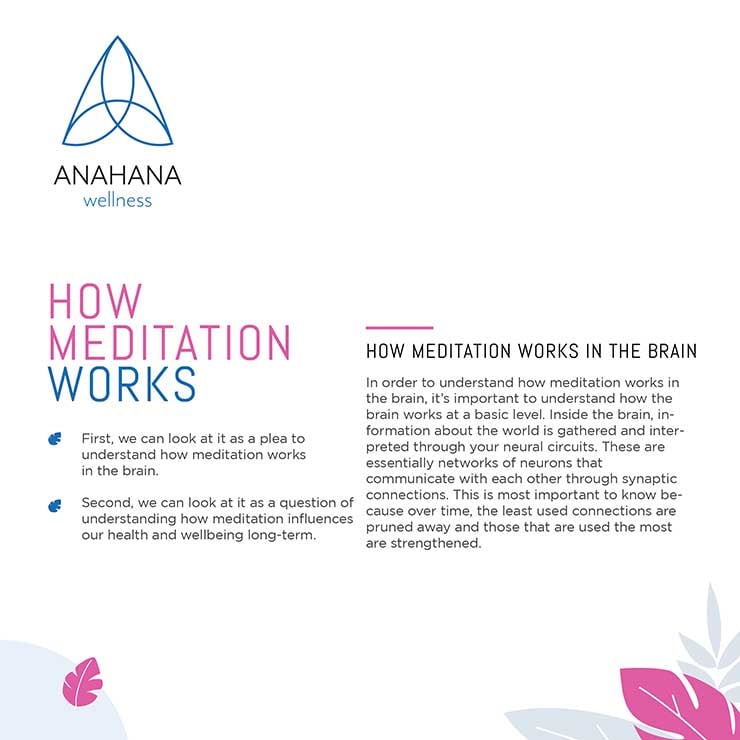
Table of Contents
Most of us have heard the virtues of meditation extolled time and again. But what do we really know about how meditation works? What is meditation? What is meditation used for?
Understanding the science behind meditation can make it more appealing to many people.
Key Takeaways
-
Neurological Impact: Meditation enhances brain function, shifting from stress-inducing sympathetic activation to calming parasympathetic response, improving focus and emotional regulation.
-
Health Benefits: Regular meditation reduces chronic stress and pain, promoting heart health and mitigating symptoms of mental illness.
-
Mental and Emotional Health: Meditation helps maintain presence in the moment, decreasing negative thoughts and increasing mental stability and inner peace.
-
Incorporation into Daily Life: Adopting meditation practices with breathing exercises into everyday routines can significantly improve both physical and mental health, enhancing overall wellbeing.
Meditation Explained
To delve into how meditation works, we must consider its effects from two primary perspectives: its impact on the brain and its long-term influence on our overall health and wellbeing.
Neurological Effects of Meditation
Meditation significantly affects the brain, influencing both the sympathetic and parasympathetic nervous systems, which are crucial for stress response regulation. Regular meditation practice can shift the body's balance from the stress-induced activation of the sympathetic nervous system to the calmer parasympathetic nervous system. This shift reduces the physical symptoms of stress and is associated with lower blood pressure, improved heart rate variability, and enhanced digestion.
Research shows that meditation enhances the brain's ability to process emotions and maintain concentration. MRI studies demonstrate that consistent meditation practice leads to changes in brain areas related to attention, emotion regulation, and mental flexibility. This includes growth in the prefrontal cortex, the brain's area associated with higher-order brain functions such as awareness, concentration, and decision-making.
Long-Term Health Benefits
Expanding on how meditation influences health and wellbeing, its practice contributes to the management and reduction of chronic stress and pain, which are linked to a host of health issues including heart disease and mental illnesses.
Practicing mindfulness and other meditation techniques helps maintain focus on the present moment, reducing negative thoughts and enhancing overall mental health.
Meditation not only helps in reducing symptoms of physical health issues but also promotes deep inner peace and psychological stability. By incorporating meditation into daily routines, individuals experience a reduction in the symptoms of chronic pain and a significant decrease in the feelings of stress and anxiety.
Practicing meditation regularly also leads to improved emotional health. Techniques like mantra meditation, tai chi, and other mindfulness-based practices foster a state of mental calmness, aid in the management of stress hormones, and help mitigate the effects of mental health struggles.
Comprehensive Wellness Approach
Incorporating meditation into holistic health regimens can bolster physical benefits and contribute to long-term resilience against chronic conditions. Meditation programs often include a variety of practices to suit different needs, from high-intensity focus exercises like tai chi to gentle mantra recitation, catering to both the novice and experienced practitioner.
To begin with, let’s look at the brain.
How Meditation Works in the Brain
It’s essential to understand how the brain works at a basic level before digging deeper into meditation's effects on the brain. Information about the world and your experiences is gathered and interpreted through your neural circuits inside the brain.
These are essentially networks of neurons that communicate with each other through synaptic connections. This is most important because, over time, the least used connections are pruned away, and those used the most are strengthened.
As you meditate, you exercise some of the most beneficial connections that offer super-charged results for your health and well-being. In effect, repeated use and strengthening of these connections can result in the following positive changes:
Better Awareness of the Body
While in medication, one of the goals is to become more aware of your physical body. You are tasked with noticing how every part of you feels — the sensations in your shoulders, back, and head; what it feels like to have your lungs expand and contract with each breath.
Noticing these sensations will strengthen those connections that pertain to how you perceive and interpret your physical body awareness. The effects will persist over time.
Increased Awareness
One of the most frequently-cited benefits of meditation is an improved attention span. Essentially, when you meditate, you are exercising your brain’s ability to focus on just one thing at a time.
In any session, that might be your breath, a mantra, an object, or an aspirational emotion or sensation (like peace). With this exercise, your strengthened focus can extend to other parts of your life. As an example, you’ll be better able to spend undistracted time on a project.
Less Focus on “Me”
Everyone has a “Me Center” in their brain. Its scientific name is the medial prefrontal cortex. This part of the brain is responsible for interpreting your unique perspective on life — your experiences and the emotions you relate to.
The “Me Center” connections grow weak after continual meditation. This is good, however, because it allows you to focus less on daydreaming / ruminating thoughts about what the “self” has done wrong, how the “self” has messed up, or how the “self” is going to fail.
Regulated Emotional Responses
Meditation slows everything down — your thinking and reasoning and your emotions. Doing so helps you acknowledge the patterns you might not have seen before.
If, for example, you get worked up with worry every time you remember a specific painful experience, you might register this progression more clearly after meditating for a while. In turn, you will be better able to control and regulate these emotions the next time they come up. Moreover, these positive stress management effects are said to persist over time.
How Meditation Improves Wellbeing
Meditation is not evasion; it is a serene encounter with reality. — Thich Nhat Hanh
The beauty of meditation practice, as mentioned earlier, is in its positive effects on all aspects of our health and overall wellbeing. Incorporating meditation into your daily routine will quickly lead to positive changes in your daily routine, physical health, mental health.
Believe it or not, but mindfulness based stress reduction practices, including meditation, have positively shifted dynamics in those with post traumatic stress disorder, irritable bowel syndrome and ADH.
Now, let’s look at some most easy-to-achieve meditation practice benefits.
Slows You Down
Modern life is extremely fast-paced which ultimately leads to increased stress levels, psychological distress and increased anxiety. In order to combat and navigate the turmoil of today’s reality, it’s essential to slow down and cultivate more peace in the day-to-day.
Since meditation, in itself, is about slowing down, it’s a great tool to activate more stilness and calm. Despite being an actual activity, meditation practice focuses on reversing the motion andoing internal work by simply focusing on the present, rather than chasing towards something.
The goal is to sit in stillness with an exceptional focus on presence. Practiced the right way, meditation is the perfect remedy for those who struggle with sleep problems as it helps you calm your mind before bed.
Improves Sense of Focus
Each moment of a meditation session is crucial. Each second of an in-breath or out-breath is approached with awareness and absolute presence. Once you master this mindfulness technique during your practice, you will easily start applying the same principles to your day-to-day routine and any challenging moments.
Practiced frequently, meditation improves overall focus wherever and whenever you are.
Mindfulness meditation, especially, will train your brain to notice the little things around you and within you.
Instead of being distracted by jarring and frightening events of the past or future, you can pay attention to the beauty and splendor of the present.
Softens Your Muscles
Meditation is excellent for cramped or tight muscles. With better awareness of the body, you can conscientiously release strain in those areas that are contracted or especially tense.
Promotes Positive Emotions
Alongside combating the negative effects of a modern man, meditation can make you feel good and take control of your negative thoughts.
Emotional regulation is a big aspect of meditation and good evidence suggests that consistent practice appears to boost serotonin levels aka happiness hormones.
Trying Meditation for Yourself
Here are some tips to help you get started with meditation.
1. Start small.
No need to start meditating for two hours every morning and every evening. If you’re starting on your own, begin meditating for just five to ten minutes daily. Alternatively, start your practice with a meditation instructor.
The best meditation instructors will work with your personal needs in mind and cater your meditation session to your unique goals. To further boost your meditation training, you can start meditating a teacher for longer periods of time. The remarkable thing is that you’ll instantly notice positive changes in your life.
2. Don’t be too rigid.
Meditation is a journey, not a destination. Don’t worry if you don’t take to meditation right away. Don’t worry if you only do a five or ten-minute session. Don’t worry if you feel wiggly or uncomfortable during your first few meditations — or if your mind wanders. All of these things are a part of the learning process.
3. Incorporate it everywhere.
You don’t need to devote your life to meditation. You can practice it anywhere. Mindfulness, for example, is a sister to meditation. With mindfulness, the goal is to put all of your focus and attention on the present moment — no matter what is happening. In this way, mindfulness techniques apply anywhere, anytime.
Whenever you feel you mind wandering during a task, find yourself in a stressful situation, or in a fight or flight mode, come back to what you practice during your meditation and apply it to real life.
Meditation: Frequently Asked Questions
How do you meditate on something?
Guided meditations and imagery-based meditations will often have you focus on something. For example, you might focus on a mantra (a personal “slogan” that you repeat during meditation).
Or, you could focus on visualizing a peaceful setting, like a beach landscape or a beautiful mountain view. You can also meditate on a thought or feeling, such as “peace,” “compassion,” or “calmness.”
What are some of the different types of meditation techniques available?
There are many different types of meditation. Here is a list of some of the most common types:
- Sitting meditation
- Mindfulness meditation
- Sleep meditation
- Transcendental meditation
- Movement meditation
- Mindful meditation
- Compassion meditation
- Nature meditation
- Focused Attention Meditation
- Loving kindness meditation
- Mantra meditation
How long does it take for meditation to work?
Meditation is highly effective, but remember that it’s not like taking a pill. You won’t see your mental state change overnight. Instead, you will make incremental progress by practicing continuously.
Over time, you’ll be able to take a step back and truly see how your mental state and wellbeing have changed with the practice. This is why it’s important to give meditation time.
References
How Does Mindfulness Meditation Work?
The Power of Meditation » the nerve blog | Blog Archive | Boston University
Meditation's Effects on Emotion Shown to Persist
The neuroscience of meditation
Disclaimer
The contents of this article are provided for informational purposes only and are not intended to substitute for professional medical advice, diagnosis, or treatment. It is always recommended to consult with a qualified healthcare provider before making any health-related changes or if you have any questions or concerns about your health. Anahana is not liable for any errors, omissions, or consequences that may occur from using the information provided.


By: Meriah McCauley
Meriah McCauley is a leading voice in holistic healing, known across North America for her expertise in chakra balancing, spiritual alignment, and energy-based wellness. Her work bridges the art and science of mind-body healing, shaped through years of study, practice, and mentorship. Meriah deepened her understanding of spiritual anatomy and the chakra system under the guidance of her guru, Dr. Don Stapleton, during her immersive training in Costa Rica. She later earned her Master’s degree in Psychology from Columbia University, specializing in Spirituality and the Mind–Body connection, which continues to influence her integrative approach. Today, she supports individuals and practitioners through coaching, yoga teacher trainings, chakra-focused education, and Holotropic Breathwork for personal transformation. Meriah is dedicated to helping others develop emotional clarity, energetic balance, and spiritual resilience—and she remains committed to guiding anyone seeking a deeper, more meaningful connection with themselves.